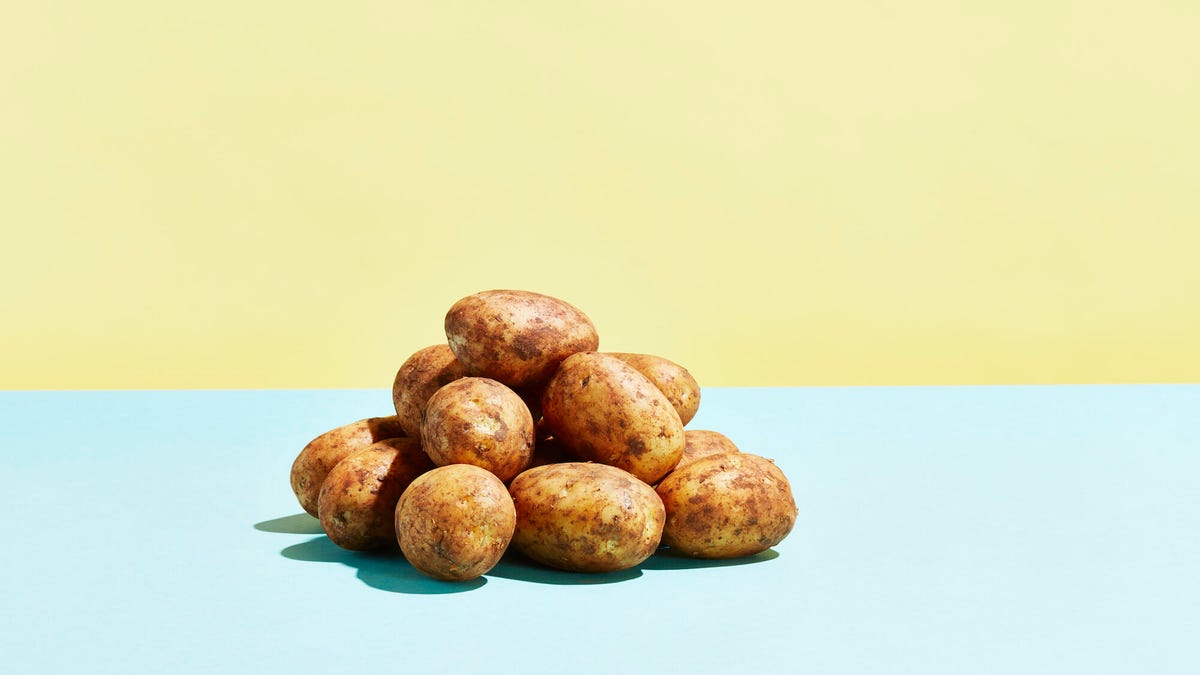Avoid this one mistake when storing potatoes
A guide to buying and storing spuds.

If you've been paying attention to the experts, you know that we needn't be hoarding anything during the coronavirus outbreak -- so please don't -- but keeping your fridge and pantry well-stocked while we wait out quarantine is smart (and comforting). A stocked kitchen also means fewer trips to the market and fewer chances to contract or spread the illness. Double bonus.
If you're like me, you were (and still are) far more interested in stockpiling carbohydrates than paper products. Perhaps you panic-bought a surplus of starch and, if so, may also be wondering how best to store your potatoes so they'll last longer. Hearty as they seem, potatoes are vulnerable to outside elements but if you can remember a few easy tips, your 'tates will keep for as long as two or three weeks.
Coronavirus updates
We got the potato storage low-down straight from the source: Heidi Alsum Randall is a Wisconsin potato farmer who graciously shared her know-how with regard to purchasing and properly storing potatoes -- that most versatile of vegetables -- so they keep. One big mistake folks make when storing potatoes, according to Randall, is putting them in airtight containers or plastic bags, the way you might for other foods and vegetables. Potatoes need circulating oxygen to avoid rot so remembering that, as well as these other easy tips, will keep your potatoes fresher for longer.
How to shop for potatoes
Don't get hung up on looks. Vegetables are often described as perfect and imperfect in the industry but "imperfect" potatoes are just as good. If your potatoes look like they went a few rounds with Rocky, simply cut off any cuts, bruises or discoloration before cooking.
Go hard or go home. A potato should be fresh-looking but also hard to the touch. If the potato is starting to soften or smells funny, even a little bit, it's probably not long for this world and should be avoided.
How to store potatoes
Potatoes, when stored properly, should last about two weeks. Some varieties like new, creamer, petite or fingerling potatoes may have a slightly shorter shelf life.
Store potatoes in a cool, dark, well-ventilated place. At all cost, avoid high temperatures such as below sinks, next to windows or near appliances that get hot. High temps will cause your potatoes to spoil faster.
Be sure air can reach your potatoes. There is a reason potato bags and sacks at the grocery store have holes or mesh. Either store your potatoes loose in a bowl or in a plastic or paper bag with holes.
Never refrigerate or freeze fresh potatoes before cooking. In certain instances you can freeze them after cooking, as with potato soup or puree but, in general, potatoes don't take well to freezing. If you absolutely have to freeze them before preparing, they must first be blanched. Submerge them in boiling water for between 3 and 5 minutes, depending on the amount of potatoes.
Don't wash potatoes before storing. Why? Because dampness will lead to early spoilage. Wait until you're ready to use them to give them a good scrub.
Check potatoes regularly and remove any that show signs of spoilage, as this will spread to the others.
If potatoes begin to sprout, you can still cook them. Just remove the sprouts and cut away any green areas. Sprouts are a sign that the potatoes may be turning, however, sp you should try to use them up quickly
For more information and recipes for your potatoes check out Chowhound's complete guide to potatoes.

